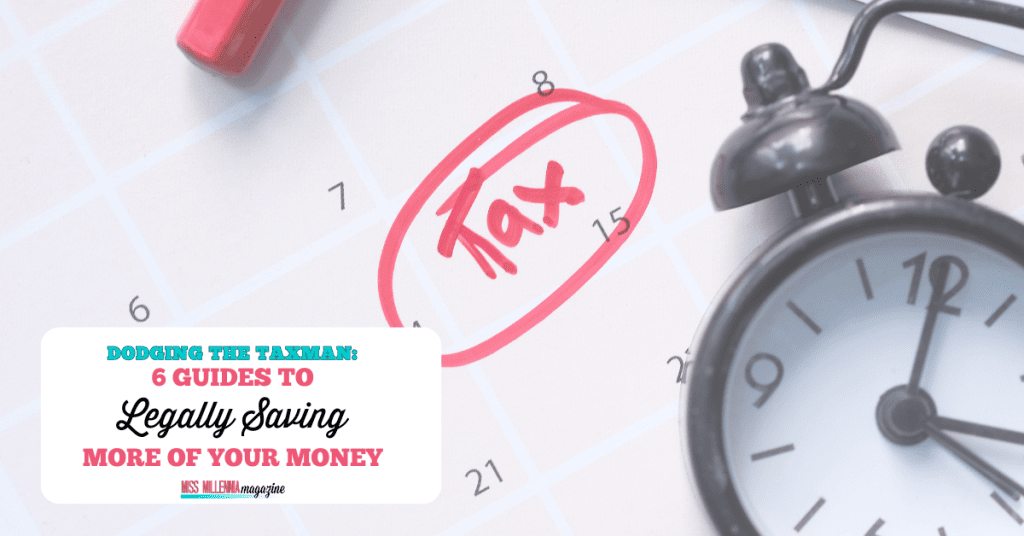Dodging the Taxman: 6 Guides to Legally Saving More of Your Money
Financial obligations can be overwhelming, and taxes often feel like the Minotaur – unavoidable yet voracious. But we want you to know there are secret passageways deep within the tax code labyrinth that offer ways of legally saving on taxes – potentially keeping more of your own money in your wallet. Yes, even among all the intimidating jargon and deadlines lurk opportunities for tax-free payments, which could significantly improve your financial picture.
1) Understanding Tax-Free Payments
Think of hidden treasure troves tucked away inside the daunting fortress of the tax code, accessible only to those who know where to search. These strategies do not constitute tax code loopholes intended for use by dishonest or fraudulent actors; instead, they represent legitimate strategies supported by them. For instance, certain insurance payouts relating to health-related incidents often do not count as taxable income. At the same time, money put into or withdrawn from a Roth IRA under certain conditions can grow tax-free and be withdrawn tax-free – serving as an ideal cloak against financial obligations. Gifts and inheritances within certain limits can also enter your bank account without incurring taxes.
Understanding these opportunities is like learning the secrets of an exclusive financial club. Tax preparation should not be seen as a way of dodging your responsibilities. It’s about maximizing your money’s potential within the rules and optimizing its growth potential. Achieving this requires an eye for detail and a willingness to engage with complex tax code requirements, turning what can sometimes feel like an onerous burden into an enjoyable quest for financial optimization.
2) Retirement Accounts Can Open Doors
While retirement accounts may seem like simple financial vehicles for your golden years, they hold immense potential as powerful tax strategies. Traditional and Roth IRAs, along with their counterparts 401(k)s and 403(b)s, each provide unique opportunities for tax savings. Traditional retirement accounts allow for tax-deductible contributions, meaning any income invested today can be subtracted from your taxable income and thus reduce the immediate tax burden. Tax-deferred growth accounts offer investors an ideal environment where their investments can grow without being subject to taxes until withdrawal at retirement, hopefully at lower tax rates. Roth accounts, which allow post-tax contributions, offer their own unique set of advantages.
Although they provide no immediate tax deduction, tax-free investments and withdrawals make them invaluable tools for those anticipating higher tax rates. This duality offers an attractive landscape for strategic financial planning, enabling individuals to balance their portfolios with tax-deferred and tax-free growth. By understanding what each type of retirement account does differently, savers can more effectively plan for their financial future while navigating tax law more nimbly.
3) The Enigmatic World of Annuities: A Houdini Act in Finance
Annuities are like an incredible magic show in finance, mysterious yet undeniably captivating! Imagine handing an insurance company your hard-won wealth, whether acquired through years of hard work or illicit deeds, in exchange for their promise of lifetime payments – an annuity is at its core, offering security with every payout promise made. An annuity provides a steady income stream until the curtain closes on your grand performance of life – but like any good magic show, there’s more than meets the eye! Annuities come in many shapes and forms – instant or deferred, fixed or variable – each offering different benefits, risks, and fees.
A carefully chosen annuity can protect against outliving your savings – an unnerving possibility that could expose your family if your savings run dry. However, selecting an annuity requires insight and discernment into one’s financial landscape. When done right, its proper usage can bring peace and serenity into one’s retirement years. Learn how to navigate tax law effectively to plan for the future with JGW and future payment forecasts.
4) Health Is Wealth with HSAs and FSAs
In the intricate web of personal finances, Health Savings Accounts (HSAs) and Flexible Spending Accounts (FSAs) stand out as unsung heroes – expertly weaving together health and wealth like no one else could. These mechanisms don’t merely act as safe deposit boxes for your savings; they provide tax advantages that enable you to confront medical expenses with financial vigor that rivals knights in shining armor. Imagine stashing away an untaxed portion of your earnings before the tax collector comes knocking, only to retrieve it later as you battle medical and prescription costs – like unlocking a secret spell that protects wealth while improving health.
HSAs provide tax-deducted contributions and tax-free withdrawals for qualifying medical expenses, making them ideal long-term savings and investment vehicles in one’s health journey. FSAs offer more immediate help, allowing for pre-tax contributions with the “use it or lose it” caveat in mind—an exciting race against time to use these funds within one calendar year. Both accounts are potent weapons against unanticipated medical expenses, proving that health is wealth in personal finance.
5) Educational Savings – Investing Tax-Free
Like alchemists of old, wise savers employ magic to turn after-tax dollars into an abundance of education savings funds without incurring taxes in future years. As education savings vehicles, 529 plans and Coverdell Education Savings Accounts (ESAs) are the cornerstones. Like a steadfast horse in its pursuit, these accounts gallop ahead with tax-deferred growth with tax-free distributions when used towards qualified educational expenses. Imagine investing your dollars to win in the stock market and becoming unburdened by taxation’s heavy chainmail, then withdrawing them triumphantly to pay tuition fees or textbook costs without paying taxes. That is precisely how it feels when doing well financially in life!
The 529 plan provides maximum flexibility through higher contribution limits. It includes funding for any level of education, whether that means dreaming big for college for your children or yourself in terms of career change. Coverdell ESAs offer an efficient means of saving for education with tax-efficient savings plans that cover kindergarten through college expenses. These accounts stand as courageous champions in a land of education savings, promoting tax-efficient investing while safeguarding its future.
6) Beyond Borders – Understanding Tax-Free Income for Expats
Expats looking for tax-free income should not limit themselves to just their homeland’s borders – their search extends across new lands in search of career and adventure opportunities. Understanding the tax repercussions of their global income is as crucial to modern-day explorers as understanding cultural nuances in each country they settle. The United States stands alone among nations by taxing both citizens and resident aliens on all of their worldwide earnings. Foreign Earned Income Exclusion (FEIE) and the Foreign Tax Credit (FTC) effectively safeguard against double taxation. FEIE allows eligible ex-expats to be exempt from some foreign earnings from U.S. taxes, effectively creating tax-free income provided they meet specific residency or physical presence criteria in another country.
The FTC allows an income tax credit for taxes paid elsewhere, protecting expats from double taxes on their money. Combined with tax treaties and the Foreign Housing Exclusion, these provisions create strategies that can significantly lessen an expatriate’s tax burden—turning global income taxation into an opportunity for financial efficiency and peace of mind.
Conclusion
Navigating the tax landscape doesn’t need to be an exercise in futility. By understanding and using tax-free accounts and payments, you can protect parts of your treasure from Uncle Sam without violating the game’s rules – instead, using knowledge as your most precious currency for financial success. So start exploring your options today so next tax season won’t bring with it financial anxiety or despair! Knowledge truly is power!









